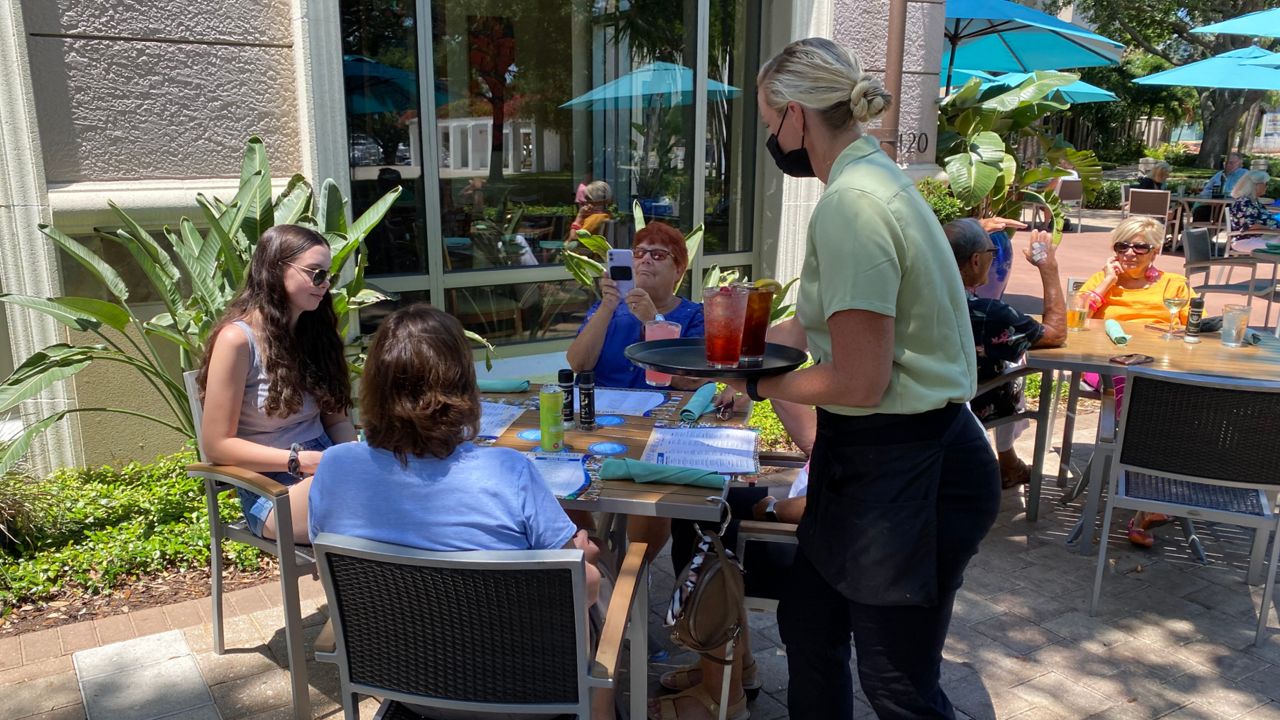There has been a variety of factors contributing to the worker shortage problem that has hit the service industry in the Tampa Bay area especially hard, according to local economists.
What You Need To Know
- At the beginning of the pandemic, some workers left one industry, found jobs in another industry and won't return
- Older workers, 65 and up, retired permanently
- One of the biggest factors has been the extension of unemployment benefits
"At Fifth Third we refer to this economic episode that we're going through as the 'Great Disruption,'" said Jeff Korzenik, chief strategist at Fifth Third Bank. "Because it's really unlike typical business cycle recessions."
Korzenick said this episode's also unique because it has been driven by a health event that locked down the economy and changed people's behavior of where they work, eat and shop. The strategist believes the effects from the pandemic will have long lasting implications for the U.S. economy.
"That means industries are disrupted, career paths are disrupted, and whenever you have that kind of disruption it tends to create mismatches. The job openings might not be where the job seekers are," said Korzenick. "The job openings might not be in industries where the job seekers have come from. All of those things to our thinking means we're going to have some protracted workforce shortages."
The St. Pete Hospitality Group owner, Steve Westphal, said he has had the most difficult time hiring employees for his three restaurants: 400 Beach, Parkshore Grill and The Hangar.
"This has been one of the hardest years to have and keep employees," said Westphal. "Business has been great, huge, the numbers that we're trying to do in sales."
Westphal said he had to close early during Easter weekend because of a lack of staff.

Florida's economy is tracking towards pre-pandemic levels where there was already a workforce shortage. (Josh Rojas/Spectrum Bay News 9)
"It was all we could do to take care of the crowds that we had with the minimal labor that we have," he said. "To some degree we've had to curtail our hours and our menu offerings."
Korzenik said there's a variety of factors contributing to the Great Disruption. At the beginning of the pandemic, some workers left one industry, found jobs in another industry and won't return. Older workers, 65 and up, retired permanently. Some workers have not returned yet for health reasons. Finally, one of the biggest factors has been the extension of unemployment benefits.
"We've seen this before back in 2009, when unemployment benefits were extended for 99 weeks. It is a temptation for people - not necessarily to sit - but it means people aren't forced to make tough decisions that sometimes you have to make in the aftermath of a recession," he said. "Taking a job that you don't really want as much or starting a new career in a different industry or moving to get a job you want and it tends to delay those kind of decisions, which creates more workforce shortages."
Westphal believes he'll have an easier time hiring employees after the $300 weekly federal unemployment extension runs out on September 6.
"I think as the assistance goes away that the workforce will return," he said. "We will welcome them with open arms."
The Department of Economic Opportunity's chief economist, Adrienne Johnston, said there's one more factor. Florida's economy is tracking towards pre-pandemic levels where there was already a workforce shortage.
"I will remind you, that we did have a very similar situation prior to the pandemic," Johnston said. "So, if we were to go right back to where we were in terms of all levels, employers were having those same issues."
According to the DEO, the unemployment rate in February 2020 was 3.1%, with 321,000 job seekers. Last month, the unemployment rate was 4.7%, with 475,000 job seekers.
Korzenik said what those unemployment numbers don't show are the percentage of the adult population that has actually stopped looking for a job.
"We've kicked people out of the labor force," he said. "It's going to be a challenge to bring them back in."
Korzenik is also the author of "Untapped Talent" and said employers are going to have to get creative to find workers.
"For instance, if a job opening requires a college degree in the listing, do they really need a college degree to do the job?" he said. "They may have to be more involved in training or they may have to look to marginalized populations like people who have criminal records to find the workforce that they need."
Westphal said he's offering incentives and would like to see a robust worker visa program enacted.
"So, that we can get the bodies that we need to take care of this great country of ours," he said. "It is stressful because we all want to do our best and I have many seats to fill but I can't fill every seat if I don't have servers and I don't have cooks."
Korzenick said other industries impacted by the worker shortage include construction, accounting and manufacturing.



